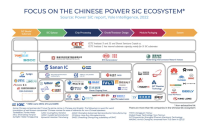Looks like Chinese companies have higher tolerance for lower margins that US companies. Without this high tolerance I think that Chinese companies would not have incentive to take risk to innovate because everyone would be behold to some investor asking for ever higher returns and scared of losing even a bit of money and stock market performance, instead of innovating. I think companies under the pressure of US export controls like Huawei would have collapsed years ago, also SMIC and YMTC.
I agree with this video,one important but often overlooked problem caused by this rat race 内卷, is that it pushes supply chain out of China,both low and high end,at a rate much faster than the US did in the past.
Because the capital return is so low in China , and virtually every sector is so crowded now. Chinese capital is increasingly move overseas,even if there is huge risk involved
The only reason that China semiconductor industry has survived the barrage of US export controls is because their high tolerance to lower margins and higher tolerance to stock performance. Would have been impossible to AMEC and Naura to even make tools, both companies operated for years on very tight margins due high cost of research under US pressure. The EV industry in China exist because this high tolerance because for many years companies like BYD operated their EV subsidiaries basically under loss, not been able to compete against companies like Tesla until their bet pay off. China Battery and SiC ecosystem wouldn't also exist.

Chinese AI models like Alibaba Qwen, moonshot Kimi-K2, Ziphu GLM, High flyer DeepSeek, Tencent, Baidu and other wouldn't have exist without China tolerance to lower margins, different from the US counterparts that are behold to investors therefore more difficult to open source, create communities and ecosystems like their Chinese counterparts.
At the end of the day there should be a balance, you don't want a "rat race" but also you don't want your companies to be hyper focus in margin, stock performance and so on that forget to innovate and compete against each other. Also you don't want investors hyper focus in a few companies. Like always the market will take care of non-performant and excesses.
